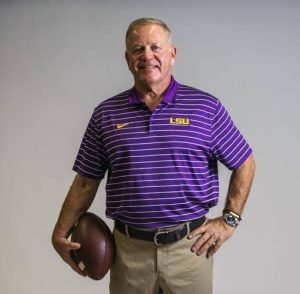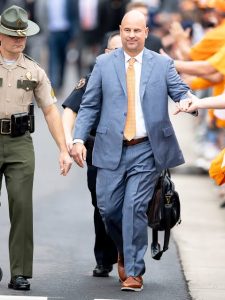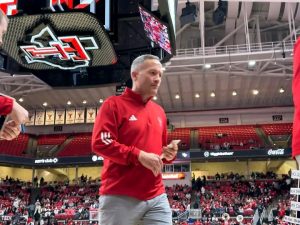
LSU’s Brian Kelly Slams NIL System as “Absolutely Crazy,” Calls for Salary Cap

BATON ROUGE, La. — LSU head football coach Brian Kelly, who signed a $95 million contract in 2021, is raising eyebrows across the college football world with his latest criticism of the Name, Image, and Likeness (NIL) system. Kelly described the current NIL landscape as “absolutely crazy” and called for a salary cap to bring structure and fairness to player compensation.
In a recent appearance on the “Dan Le Batard Show,” Kelly compared the chaotic NIL environment to the NFL’s salary structure. According to Kelly, college recruiting has turned into a bidding war, with players, families, and representatives negotiating lucrative deals at every level of the recruitment process.
“We’re out there recruiting high school seniors, and they want a freshman signing bonus,” Kelly said. “Then the transfer portal guys are looking for a free agent deal, and the players already on your roster? They want retention bonuses. It’s all about the money now.”
Kelly, who is entering his third season with LSU, expressed concerns that the NIL system — originally intended to give college athletes the ability to profit from their personal brands — has morphed into something far more transactional, often overshadowing athletic development and team culture.
“Without a salary cap, you just can’t compete fairly,” Kelly said. “There are no rules. It’s like trying to run an NFL team with no cap and no collective bargaining agreement. That’s not sustainable for the sport.”
The LSU coach isn’t alone in his concerns. Numerous college football coaches have spoken out in recent months about the unpredictable nature of NIL and its impact on recruiting. But Kelly’s voice carries weight not only because of his stature in the game, but also because of LSU’s high profile in the NIL era.
LSU has already felt the pressure of this new landscape. The Tigers recently missed out on several highly-ranked recruits, including five-star quarterback Bryce Underwood, who chose Michigan. Reports suggest that Underwood received NIL offers approaching or exceeding $10 million — a number that Kelly and his staff were unwilling or unable to match.

Kelly has been open about the fact that the Tigers have had to rethink their recruiting strategy. “It’s not just about the right fit anymore,” he said. “It’s become about who can pay the most. That’s not how college football should work. We’re trying to build character, build teams — not just make offers.”
In an effort to address this challenge head-on, Kelly has announced plans to hire a dedicated “salary cap manager” to help LSU’s football program better navigate NIL deals and budget responsibly. This role, Kelly says, will focus on helping the program develop a structured and transparent NIL system — much like what’s seen in professional sports.
“I can’t sit across the table from a parent and say, ‘Your son is worth X dollars,’” Kelly explained. “That’s not my area of expertise. I’m here to develop players and help them succeed. But we need professionals who can manage this side of things, because it’s now a huge part of the game.”
To further support LSU’s NIL efforts, Kelly also launched the “Million Dollar Match” campaign, pledging to match up to $1 million in donations to the university’s NIL collective. An anonymous donor quickly stepped in to match Kelly’s contribution, resulting in over $3 million raised to help keep LSU competitive in the NIL arms race.
Despite these efforts, Kelly stressed that real change must come from a higher level. He joined several other prominent coaches in calling for federal legislation that would create consistent rules and expectations across all states and schools.
“College football is at a crossroads,” Kelly said. “If this doesn’t get fixed soon, we’re going to lose what makes this game special. We need federal help. We need uniformity.”
As the NIL era continues to evolve, coaches like Brian Kelly are trying to strike a balance between empowering athletes and maintaining fairness in college athletics. Whether his calls for reform will lead to action remains to be seen — but Kelly has made it clear he believes change is necessary, and soon.
Sure! Here’s a rewritten version of the article in plain text format, expanded to around 670 words:
—
LSU’s Brian Kelly Slams NIL System as “Absolutely Crazy,” Calls for Salary Cap
BATON ROUGE, La. — LSU head football coach Brian Kelly, who signed a $95 million contract in 2021, is raising eyebrows across the college football world with his latest criticism of the Name, Image, and Likeness (NIL) system. Kelly described the current NIL landscape as “absolutely crazy” and called for a salary cap to bring structure and fairness to player compensation.
In a recent appearance on the “Dan Le Batard Show,” Kelly compared the chaotic NIL environment to the NFL’s salary structure. According to Kelly, college recruiting has turned into a bidding war, with players, families, and representatives negotiating lucrative deals at every level of the recruitment process.
“We’re out there recruiting high school seniors, and they want a freshman signing bonus,” Kelly said. “Then the transfer portal guys are looking for a free agent deal, and the players already on your roster? They want retention bonuses. It’s all about the money now.”
Kelly, who is entering his third season with LSU, expressed concerns that the NIL system — originally intended to give college athletes the ability to profit from their personal brands — has morphed into something far more transactional, often overshadowing athletic development and team culture.
“Without a salary cap, you just can’t compete fairly,” Kelly said. “There are no rules. It’s like trying to run an NFL team with no cap and no collective bargaining agreement. That’s not sustainable for the sport.”
The LSU coach isn’t alone in his concerns. Numerous college football coaches have spoken out in recent months about the unpredictable nature of NIL and its impact on recruiting. But Kelly’s voice carries weight not only because of his stature in the game, but also because of LSU’s high profile in the NIL era.
LSU has already felt the pressure of this new landscape. The Tigers recently missed out on several highly-ranked recruits, including five-star quarterback Bryce Underwood, who chose Michigan. Reports suggest that Underwood received NIL offers approaching or exceeding $10 million — a number that Kelly and his staff were unwilling or unable to match.
Kelly has been open about the fact that the Tigers have had to rethink their recruiting strategy. “It’s not just about the right fit anymore,” he said. “It’s become about who can pay the most. That’s not how college football should work. We’re trying to build character, build teams — not just make offers.”
In an effort to address this challenge head-on, Kelly has announced plans to hire a dedicated “salary cap manager” to help LSU’s football program better navigate NIL deals and budget responsibly. This role, Kelly says, will focus on helping the program develop a structured and transparent NIL system — much like what’s seen in professional sports.
“I can’t sit across the table from a parent and say, ‘Your son is worth X dollars,’” Kelly explained. “That’s not my area of expertise. I’m here to develop players and help them succeed. But we need professionals who can manage this side of things, because it’s now a huge part of the game.”
To further support LSU’s NIL efforts, Kelly also launched the “Million Dollar Match” campaign, pledging to match up to $1 million in donations to the university’s NIL collective. An anonymous donor quickly stepped in to match Kelly’s contribution, resulting in over $3 million raised to help keep LSU competitive in the NIL arms race.
Despite these efforts, Kelly stressed that real change must come from a higher level. He joined several other prominent coaches in calling for federal legislation that would create consistent rules and expectations across all states and schools

“College football is at a crossroads,” Kelly said. “If this doesn’t get fixed soon, we’re going to lose what makes this game special. We need federal help. We need uniformity.”
As the NIL era continues to evolve, coaches like Brian Kelly are trying to strike a balance between empowering athletes and maintaining fairness in college athletics. Whether his calls for reform will lead to action remains to be seen — but Kelly has made it clear he believes change is necessary, and soon





